Feature
Breaking Babble
TV Feature
Ed Williamson,
Matt Looker,
Ali Gray,
Luke Whiston
2nd October 2013
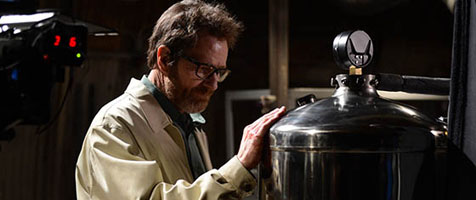
Ed: I didn't think that as an episode Felina was one of their greatest, but I don't think that matters in the least: the main thing is it finished it off satisfactorily. A finale is only one part of a huge story, and it needs to serve a function, not necessarily be a great standalone episode.
What narrative purpose does it serve that the gang are neo-Nazis, when they never commit any hate-crimes? Answer: it makes them irredeemably bad, with no shades of grey. It gives us a recognisable bad guy in a series that never fully committed to anyone's goodness or badness. Even Gus we saw in flashback having his partner murdered by the bloke from Scarface, letting us sympathise with him a bit. I think the audience needed that: there had to be someone bad enough who definitely deserved to die, no questions asked, in order for a satisfying ending.
As a result, while I really liked it overall, I did find Walt's despatching of them a bit mechanical: he planned it, then did it, and other than his keys being put on the pool table, it never really seemed that an obstacle might prevent him from doing so. The more interesting thing was what happened with him and Jesse, and was always going to be, I suppose.
Ali: It was not surprising but it was satisfying. I think you'd have to trade off one to achieve the other. The most surprising bit for me was Walt saying the real reasons he did what he did: "I liked it. I was good at it. I was alive." I wasn't expecting that.
Matt: Totally agree: the line "I did it for me" rather than "I did it for my family". That was shocking. Never realised until that moment that that's what everyone is rooting for Walt to do - to take ownership of everything. To be honest and stop using his family as an excuse. Such a brilliant turnaround for the character.
Ali: Narratively, I think Felina just continued on its course and hit all its marks like a good finale should. More than any other episode this season it was predictable (the ricin in the Stevia, the gun-turret, letting Jesse go free) but these were all massive, crowd-pleasing moments. It would have been brave to subvert any of the endings it had foreshadowed.
Personally I could see no narrative worth in Vince Gilligan killing Jesse, nor in letting Walt survive - or indeed, Uncle Jack and his Nazi clubhouse. I don't think a finale should go out of its way to shock. It should be a full stop, not an ellipsis, and I genuinely can't think of a more satisfying way to end it than with Walt dying in a chemistry lab.
Matt: The finale was great as far as I'm concerned. You're right - not the best episode ever (that honour may have to go to 'Ozymandias') but the final part of a three/four-episode arc that rounds up everything perfectly.
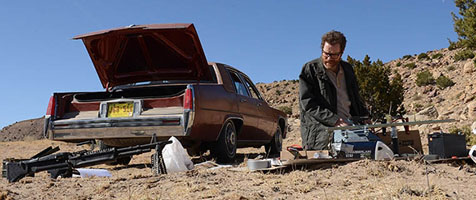
Luke: The most interesting thing about the finale is how wrong Walt's plan went. Think about it: if the Nazis hadn't brought Jesse into the room (remember he only realised Jesse was actually still alive when he found out blue meth was still on the streets - Todd couldn't replicate the colour), Walt would have died in the gunfire along with everyone else. But he bundled Jesse to the ground and accidentally lived a bit longer, which is also the only reason he was able to make the phone call to Lydia.
Ali: Walt's final plan is a little contrived, admittedly. Because if the Nazi clubhouse was upstairs or downstairs or anywhere that wasn't behind a little brick wall, Walt would have spent a hell of a lot of time setting up a gun turret for nothing. And then Jack bringing Jesse into the room, as opposed to taking Walt to see Jesse in his hole, or even just not showing him Jesse it all, is a touch convenient. You can see the cogs in motion, but it was all necessary, so I let it go.
Incidentally, Vince Gilligan has said that Walt's plan all along was to kill Jesse. Only when he sees Jesse is being kept as a slave does he decide to let him live.
I am already preparing my QI Klaxon for people who make the 'Jesse drives off in a car/Need For Speed' connection over the coming months. It's the new 'Walt goes into witness protection and becomes the dad from Malcolm In The Middle'.
Ed: I got the impression Walt would've hit the deck anyway to save himself if Jesse hadn't been there. But the fact that he was there gave him a good reason to without it looking suspicious.
It's also - and this is sort of churlish - one of those plans that relies entirely on the fact that you're in a TV show and you know it'll work out as dramatically as it can. By which I mean, Jack has already decided to kill Walt and not listen to anything he says. Any neo-Nazi criminal gang worth their salt would just get Kenny to shoot Walt in the head the second he gets into Walt's car. Why even let him into the clubhouse? Walt's such a mastermind, he'd have figured this out. But hey, you can't complain about that too much; it's just how drama works. If it didn't, James Bond would've died in Dr No because the obvious thing to do is just shoot him in the back of the head rather than tie him to a fucking shark or whatever then leave the room.
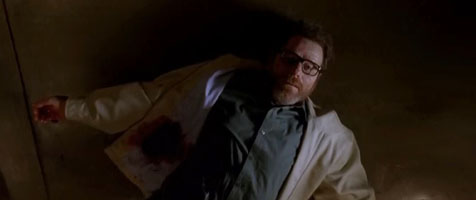
Ali: Did you clock the extra significance of Walt croaking in the meth lab? It means the police would likely think he was cooking the blue meth, meaning Jesse would effectively be off the hook.
Ed: I wasn't even convinced Walt was dead on first watch. I thought it was ambiguous whether he was just lying there and waiting for the cops. But then I read a Vince Gilligan interview and he didn't even raise it, just said he was dead. But then what does he know?
Ali: It might be a bit anti-climactic if he rights all his wrongs, leaves a bloody, iconic smear in the chemistry lab and slumps to the floor dramatically, then has a bit of a nap.
Ed: Only if you think about it in a narrow, linear way, like you obviously are. I pity you.
Matt: I kinda took that last shot, the extreme close-up on Walt's face and then slowly drift up into the ceiling to signify his death. It usually means a spirit or something leaving the body, right?
I was too afraid to mention this before in case I was wrong but it turns out I was so I might as well say it now anyway. When series five came back, Walt said that his cancer had returned, but we hadn't actually received any evidence of that until the episode before last where he was receiving chemo treatment at the lodge.
So for quite a while there was a part of me that assumed he was lying, manipulating everyone again (including every well-timed cough) and the series was going to build up to him "dying of cancer", only for it to be revealed that he had been making it up and got away scot-free. Or something. I realise it is utterly pointless for me to mention this now.
Ali: There is a shot of him receiving chemo in one of the first episodes of 5b. Very brief, but it's in there.
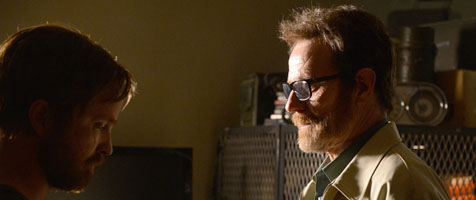
Luke: The other interesting thing is Walt and Jesse's father/son/mentor/student relationship. Walt could never teach his own son to drive properly, and at the end you see Walt happy to let him go without a goodbye, but Jesse could be taught how to cook as good as Walt - transfer his science skills - which Walt respected. the bond is unbreakable, but he can't help doing terrible things to Jesse. You see he lovingly touches Jesse's cooking equipment at the end, like "you've come so far" before he dies. Maybe realising he was about to die (remember this wasn't in his plan) brought his complex mix of emotions to the boil and a bit of happiness spilled over? I dunno. A nice cooking metaphor there for you.
Ali: I will confess to sobbing uncontrollably at the scenes of Walt saying goodbye to Holly and Walt Jr. I was an absolute mess. Amazingly, sparingly shot, totally right for the character, just heartbreaking.
The father/son teacher/student relationship between Walt and Jesse is just wonderfully handled throughout. I loved Walt tapping the counter on Jesse's lab equipment with a little smile. He realised he finally applied himself.
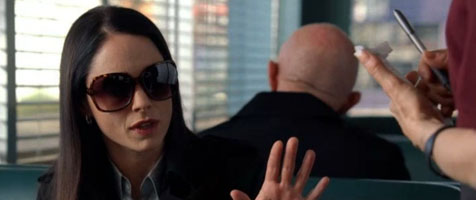
Luke: Would Lydia have definitely died - wouldn't she have gone to a doctor or hospital eventually? Also, she wasn't a murderer or anything, so I don't think Walt had a reason to kill her. Just a nasty message perhaps? Speculative.
Ali: Lydia was complicit in several murders. She's guilty as fuck. Remember Mike's eight guys? That wouldn't have happened without her. Also Walt wanted to kill her to stop the spread of blue meth and effectively ensure his legacy. And she's a total bitch. Milk in camomile tea? Jesus, woman.
The only thing I didn't particularly like in the finale was the extra phone call with Lydia at the end. I said after the shot of Lydia pouring the 'Stevia' in her camomile tea that it was nice they didn't feel it necessary to spell out exactly what had happened to her. You had a refresher shot of the ricin being retrieved, one lingering shot of the sugar packet, one shot of the white powder going in... that would have been enough for me. Didn't need the reminder.
Ed: I did. Didn't occur to me she was putting ricin in her tea until that phone call spelled it out. Then again with hindsight they'd banged on about her tea so much over the last four episodes that it had to have some significance. (Apparently it wouldn't work, anyway: ricin would be useless as soon as you put it in hot water.)
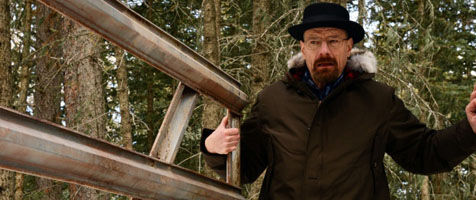
Luke: I did find Breaking Bad a very overly-simplistic series in some ways, with lots of conveniences and crazy coincidences (they even mention the coincidences in an episode, probably to abate the people over-analysing it). Seemed designed from end-to-start to make pieces fit at times. If they'd disguised that a bit better then I would have rated it higher.
Ali: It was designed from end to start to make pieces fit - it's like Vince Gilligan said, one man's transformation from Mr Chips to Scarface. (I don't think he's talking about the little yellow guy from Catchphrase).
It's the only TV show I can remember where there hasn't been an iffy season or even an iffy episode. It's paced perfectly. Naturally this means you have to move some pieces around to make that transformation happen, which includes a fair amount of luck - or, as audiences see it, contrivance. But Ed's right, it's TV drama so it doesn't quite abide by the rules. But that's OK. You wouldn't want it any other way, really. A lot of these contrivances and conveniences can just about be excused by the number of huge egos they serve, like Uncle Jack wanting to gloat before he kills the so-called genius he bested.
Luke: What I enjoyed the most was how easy it was to watch. The pace was perfect, and that's more to do with how it was designed to binge-watch via Netflix than the actual content.
Like, Game of Thrones is great, but it's so dense: doesn't matter how many boobs I'm going to see, after a while it's a cacophony of names and places and gaargh SHUT UP FOR FIVE MINUTES. Breaking Bad I could have happily watched all day.
Game of Thrones has a lot to answer for, actually: they kill off main characters so quickly and often, I didn't really bat an eyelid when Hank and Steve died.
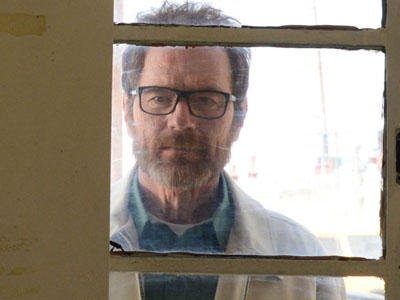
Ali: I've read a lot of people saying they didn't really consider Uncle Jack And The Little Hitlers as worthy villains for the final season. I must confess, I started off in the same mindset, but I came to love them as much as I loathed them.
Gus Fring was a tough act to follow, and once you've taken down the guy who's untouchable, I didn't think there were many things that could stand in Walt's way. But the good thing about Jack and the Nazis is that they're just out-and-out bottom-feeder scumbags. They don't play by rules or have codes of honour. It stands to reason that if you're working in the meth business, eventually you're going to run into some scumbag thieves and not everyone is going to be a high-functioning genius drug-pusher marketeer.
The fact that they were Nazis was a little convenient, but it's shorthand for 'bad guys' and I'm OK with that. I suspect it was to make Walt's last crusade seem a little more righteous.
Ed: The need for a conclusion that 'fits' was more pressing here than normal, purely because Walt broke bad. Unlike Dexter, Tony Soprano and so on, he didn't start out a bad person; he became one. Obviously, because that's the whole point of the show. When that happens you've disrupted the natural order so much you have to put it at least partially right by the end. Certainly come the last three or so episodes of The Sopranos there weren't a lot of loose ends to tie up, so to speak, other than a few hits you knew were coming, so there was no need to finish it cleanly and the audience wasn't demanding you did. It was just that we were seeing the end of the bit of this guy's life that we'd been privy to.
With Walt we needed proper closure, and we got it. 
Support Us
Follow Us
Recent Highlights
-
Review: Jackass Forever is a healing balm for our bee-stung ballsack world
Movie Review
-
Review: Black Widow adds shades of grey to the most interesting Avenger
Movie Review
-
Review: Fast & Furious 9 is a bloodless blockbuster Scalextric
Movie Review
-
Review: Wonder Woman 1984 is here to remind you about idiot nonsense cinema
Movie Review
-
Review: Borat Subsequent Moviefilm arrives on time, but is it too little, or too much?
Movie Review
Advertisement
And The Rest
-
Review: The Creator is high-end, low-tech sci-fi with middling ambitions
Movie Review
-
Review: The Devil All The Time explores the root of good ol' American evil
Movie Review
-
Review: I'm Thinking Of Ending Things is Kaufman at his most alienating
Movie Review
-
Review: The Babysitter: Killer Queen is a sequel that's stuck in the past
Movie Review
-
Review: The Peanut Butter Falcon is more than a silly nammm peanut butter
Movie Review
-
Face The Music: The Bill & Ted's Bogus Journey soundtrack is most outstanding
Movie Feature
-
Review: Tenet once again shows that Christopher Nolan is ahead of his time
Movie Review
-
Review: Project Power hits the right beats but offers nothing new
Movie Review
-
Marvel's Cine-CHAT-ic Universe: Captain America: Civil War (2016)
Movie Feature
-
Review: Host is a techno-horror that dials up the scares
Movie Review
